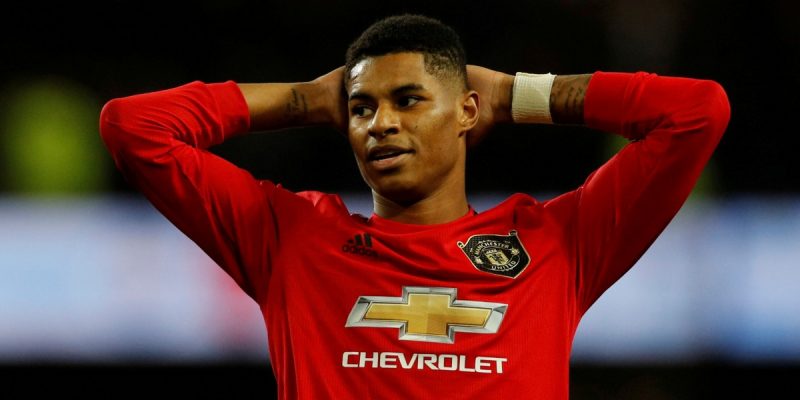It’s only halfway through the year – and there has been precious little live sport to speak of in 2020 thanks to coronavirus – but already the odds are shortening on who will win one of the most prestigious titles in British sport: the BBC’s Sports Personality of the Year. Marcus Rashford may be one of the brightest young talents to grace Manchester United’s hallowed Old Trafford stadium, but it’s not just his skill and eye for goal that are prompting pundits and fans alike to predict great things for the 22-year-old forward.
As the English Premier League resumes after a three-month hiatus, football fans across the country are keenly waiting to see how their teams will perform after such a prolonged period in isolation. But as players take to the pitch with the message “Black Lives Matter” emblazoned in place of their names on the backs of their shirts, much of the conversation revolves around how Rashford took on the country’s government and won.
The young black player, one of five children raised by a single mother in a working-class Manchester suburb, forced Boris Johnson, the prime minister, to make an embarrassing U-turn on its decision not to provide Britain’s poorest children with free school meals over the summer. As the face of the #maketheUturn campaign, Rashford is now a hero to the families of the 1.3 million children who would otherwise have gone without.
It’s a tale that provides a glimpse into two particularly complex, intertwining and incendiary social characteristics in modern Britain: race and class.
Getting the ball rolling
English football’s so-called “Project Restart” is not without controversy – its roll-out comes amid concerns over what many fear is a premature reopening of social, cultural and economic life. The virus persists, as does continuing uncertainty around its spread, control and ongoing threat. In the UK, this is exacerbated by a lack of trust in official policy, thanks to what the majority of Britons see as the government’s disastrous handling of the crisis.
Some footballers have expressed misgivings about returning to the pitch, including a number of black and minority ethnic players mindful of the heightened dangers linked to ethnicity with this virus. While the Premier League has invested in testing and safety apparatus that partially alleviate such concerns, ongoing shortages in such protections outside of football’s elite bubble – including much-heralded “key workers” in hospitals and care homes – provides a jarring context.
It’s difficult to overstate the social and cultural importance of football in Britain. Described romantically as “the people’s game”, football is both a product and reflection of wider social forces. We need only look at the past week to see how football retains deep roots in the national consciousness.
Culture wars
The week before Project Restart got underway with the first games in the Premier League, groups of football fans descended on London, ostensibly to defend public monuments, such as the statue of Winston Churchill in Parliament Square, from what they feared was the destructive intent of Black Lives Matter protesters.
Though football in the UK has its sectarian divides and distinct national allegiances, English football culture has traditionally tended to shy away from overtly political affiliations or rhetoric. Likewise, the players, seemingly well-schooled in saying as little as possible of substance, have not been known for opinions that veer too far outside football matters.
But, in recent years, the political powder kegs of terrorism, immigration, austerity and Brexit have provided the context for right-wing, nationalist and populist movements to make inroads into football supporter culture. The English Defence League (EDL) and more recently, the Football Lads Alliance (FLA) have been able to draw support from clubs throughout the country, turning out in large numbers for marches and protests ostensibly aimed at defending English or British culture from perceived threats, often connected to what they see as “liberal” policies on immigration and multiculturalism.
On June 13, protesting fans – along with far-right political agitators and some military veterans – mobilised in London and other cities with a stated aim of defending historical statues and war memorials following the recent toppling by Black Lives Matter protesters of the statue of a 17th-century slave-trader. The FLA, according to reports, seemed to come off worse in clashes with police, Black Lives Matter protesters and also, it should be noted, other groups of football fans.
That the Black Lives Matter protests and counter-demonstrations erupted during the uneven and contested easing of lockdown restrictions provides a complicated context. It is widely understood that the coronavirus and its economic impacts have and will continue to hit the poorest hardest. The isolation, fear and frustrations of recent months undoubtedly played a key role in fomenting the outpourings of collectively expressed anger and protest, in whatever direction they were aimed.
An unmistakable feature of the protests globally was their multiracial character, revealing not just a show of solidarity towards the victims of racial injustice, but also class-based solidarity between people of all ethnicities. That combination of race and class, when mixed with national identity, can be beautiful or ugly, often finding expression through cultural forms such as football.
Forcing a U-turn
The restarting of Premier League football in the UK sits alongside a poorly planned and widely resisted attempt to reopen schools to enable a mass return to work, which has exacerbated class divisions. Wealthier white-collar workers tend to be able to work at home, to flexible hours and avoid the risk of crowded public transport. Meanwhile those on the frontline – in NHS, care homes, factories, public transport and other lower-paid jobs facing a greater risk of infection – include a disproportionate number of ethnic minority workers.
While recovering from a pre-lockdown back injury, Rashford took careful notice of the problems faced in the community where he grew up. Wythenshawe in south Manchester was originally built in the 1920s as a rehousing overspill to cater for the “slum clearances” of the city’s terraced housing. Once known as the “largest council estate in Europe”, it today includes wards that regularly rate among the most deprived in the country.
Rashford had already earned praise for his work with homeless people and for learning sign language in preparation for judging a poetry competition for deaf children, even before campaigning to provide affordable food for children in poverty. The footballer joined with the charity FareShare, raising more than £20 million to help provide three million meals for vulnerable people.
When the government announced that it would end its scheme to provide children stranded at home during the coronavirus pandemic with vouchers to the value of the free lunches they would otherwise have received at school, Rashford wrote an open letter to the government to ask it to reconsider. Johnson initially rejected Rashford’s plea but, following a further appeal by the player amid increasing media and intra-party pressure, Johnson eventually announced his policy U-turn.
Rashford might bear comparison with the London-based rapper Stormzy, as well as fellow footballer Raheem Sterling who has led a powerful anti-racism campaign in support of Black Lives Matter.
All three have used their considerable talent – football in Rashford and Sterling’s case and music in Stormzy’s – as both a way out of poverty and a means to raise social issues by exploiting their public platforms. In Rashford’s case it is notable that his focus appears to stretch beyond race and towards addressing more cross-cutting class-based inequalities.
When the first matches in English football’s return kicked off on June 17, the players – with “Black Lives Matter” written across their backs – took the knee in symbolic protest of persisting inequalities and structural racism.
Rashford’s leadership has for many filled a vacuum left by the government’s handling of the pandemic and highlighted at best an indifference to issues of race and class. It will also of course make a material difference to people in real need. It was, as football pundits are so fond of saying, a “result”.![]()
Chris Porter is senior lecturer in sociology, Manchester Metropolitan University.
This article is republished from The Conversation under a Creative Commons licence. Read the original article.




